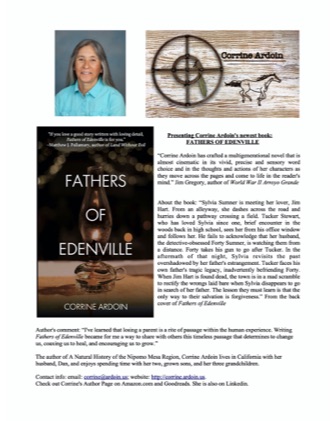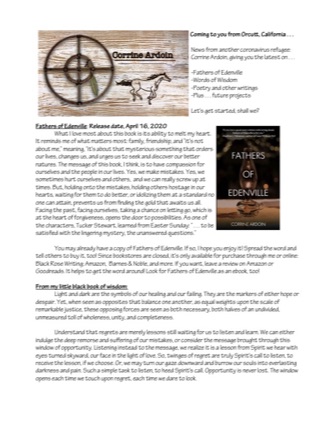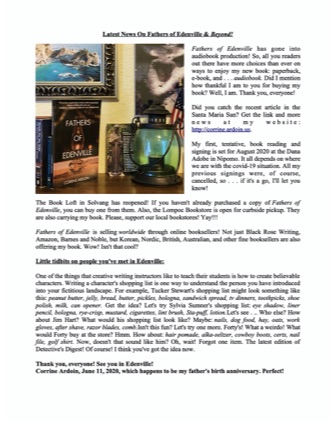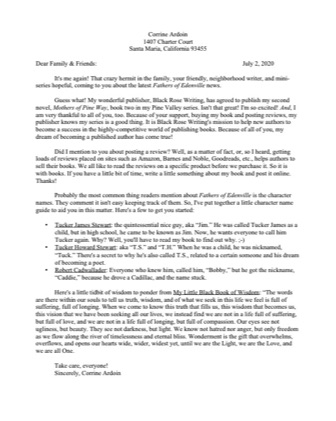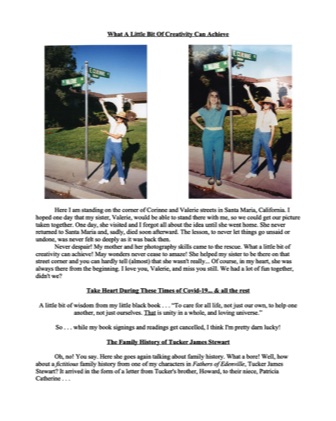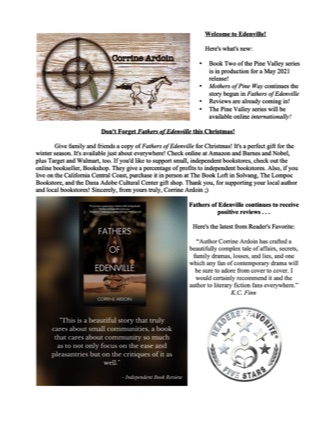Feb 28, 2020
News
Apr 16, 2020
From the Santa Maria Sun
Santa Maria author Corrine Ardoin revisits her rural town roots in her new novel, Fathers of Edenville
By CALEB WISEBLOOD
Repressed childhood memories haunt four residents of a quiet mountain community in Fathers of Edenville, Corrine Ardoin’s first novel. The Santa Maria author previously penned a local historical text, A Natural History of the Nipomo Mesa Region, but Edenville marks her first foray into long-form fiction.
The novel hit virtual book stands on April 16 (available to order through Amazon, Barnes and Noble, and other outlets), but invitations had already been mailed out for Ardoin’s private launch party before stay-at-home guidelines went into effect. The local writer also had book signing events lined up at the Book Loft in Solvang, the Lompoc Bookstore, and the Dana Adobe in Nipomo, throughout the month, which were inevitably canceled.
While the future seems full of more universal uncertainties than usual, Ardoin’s Edenville offers readers a somewhat cathartic dive into the past—but not just any past, rather her own past. Although the characters are fictional, Ardoin used memories of her own rural upbringing to help realize the town of Edenville (a setting she plans to explore even further in three upcoming sequels).
The novelist recently opened up to the Sun about her new book and the morbid real-world fear behind its poignancy.
Sun: What inspired you to write Fathers of Edenville? And is it true that writing the book was therapeutic for you?
Ardoin: I wrote to help me cope with the impending loss of my own father. Several years ago, I had a friend who lost her father and was not coping very well with that. I also lost two friends to cancer and, then, my sister. Death was huge in my life at that time, and I began to sense my own father’s end of life coming soon. I decided to write about what it would be like to lose a father, and the result was my first novel, Fathers of Edenville.
Sun: What made you choose to tell this story as a novel? I understand you wrote the book, and several others yet to be published, before writing A Natural History of the Nipomo Mesa Region (although the former was published after the latter).
Ardoin: I always wanted to write literary fiction, much in the vein of other California authors, like John Steinbeck and Jack London. Ray Bradbury was a major influence on me. One of the things Bradbury taught me was that, if you want to write a novel, begin by writing one page a day. By the end of the year, you will have written a book. I followed that religiously and have since written maybe a dozen books. I sit down to write and, without any hesitation or trying to think about what I should say, I just start writing.
Sun: What’s the key to handling a rigorous writing schedule like that?
Ardoin: I find it necessary to discipline myself, treat my writing like a job, schedule my day loosely. Working at home, there are always chores nagging and an itch to get outdoors, so I try to take these into consideration when I lay out my work for each day. I write every day, though not always with a goal in mind, simply because I need to write and it helps me process day-to-day concerns as well.
Sun: Did it take a year to finish writing the novel? (As Bradbury would have predicted). Or is your average output less or more than a page a day?
Ardoin: Sometimes it ends after a page or a few pages, but with this book, I kept going and got so interested in the story, having so much fun letting my imagination and sense of humor run, that I was done in a few months with the rough draft.
Sun: What were some of the most challenging roadblocks for you in terms of getting the novel published?
Ardoin: Two months after I completed the rough draft for Fathers of Edenville, my father passed away. I tried to get the book published over the next couple of years, but compounded grief took its toll and I put the book in the closet. I wrote other books, but repeated rejection letters can get tiresome. My Natural History of the Nipomo Mesa Region was a great success and kept me going. Fortunately, I revisited my novel a few years ago, fell in love with it again, and found myself writing the first sequel, Mothers of Pine Way, and then two more sequels. I felt my confidence grow, so I sent query letters out again and got a response immediately from Black Rose Writing. They wanted to see my book and, within two weeks, I signed a contract with them. I guess the timing was right!
Link to the Article
Jun 11, 2020
Jul 2, 2020
Sep 9, 2020
Nov 20, 2020


